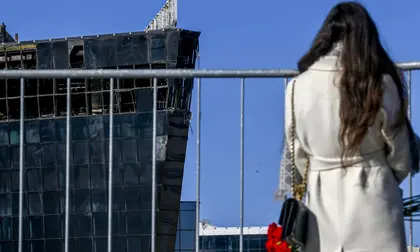In the aftermath of the attack on Crocus City Hall near Moscow, for which Islamic State (IS) has claimed responsibility, fears of attacks by Islamist terrorists are growing in other countries. France has declared the highest terror alert level, while German Interior Minister Nancy Faeser described the threat posed by IS in Germany as "acute". Commentators discuss appropriate European responses.
Joint response needed
JOIN US ON TELEGRAM
Follow our coverage of the war on the @Kyivpost_official.
The elusive nature of the IS makes concerted action against it difficult, Le Soir notes:
“The Islamic State has just as much reason to attack the West as it does to attack Russia, having clashed with it on various occasions. Whether we consider it to be at death's door or reborn and revitalised, the IS is still there. ... With its social networks, lone wolves and self-radicalised adherents, it is by definition difficult to track down and neutralise. The way in which Western states have reacted to the massacre in Crocus City Hall shows once again how hard it is to find a common response to something that is so very evasive.”
The IS was never gone
The threat posed by jihadists remains as present as ever, Die Presse warns:
“Even if people in Europe were not always willing to admit it: the IS was never gone. ... It seems the West's attitude to this threat has been one of 'out of sight, out of mind'. However the danger posed by the IS and its splinter groups should not be underestimated. The extremists' cynical propagandists are doing everything they can to recruit new members - also in Europe. Ten years ago they exploited the gruesome images of civilians killed by the regime in the Syrian civil war to radicalise young people. Today they are using fresh ammunition: the suffering in the Gaza Strip.”

British Defence Intelligence Update Ukraine 23 January 2025
Keep an eye on all the different threats
Jyllands-Posten urges vigilance:
“When the Soviet Union collapsed in 1991 it inspired exaggerated expectations of a peaceful future. Then, after the terrorist attacks of 11 September 2001, the challenge from the East was neglected. Now the debate about the defence of Ukraine has sucked all the oxygen out of discussions on security policy. ... We must be able to deal with these very different threats in parallel. This requires realism among policymakers and a shared willingness to invest in our security. The frightening alternative was played out at a peaceful concert in Moscow less than a week ago.”
Strong men don't offer effective protection
There are ways to reduce the risks posed by terrorism, stresses Deutschlandfunk:
“The arrogant and cynical refusal to take American warnings seriously illustrates a reality of the fight against terrorism: it is most successful when friendly states cooperate fully with each other. ... Often enough, German terrorism investigators act on tips from friendly intelligence services, usually the British and the Americans. It is these alliances that protect against terror. Not strong men.”
The most extreme among the extremists
The attack in Moscow makes clear how fundamentalist IS-Khorasan is, Dagens Nyheter explains:
“In a statement, IS-K describes the act in Moscow as part of the 'ongoing war against countries fighting Islam'. This is often interpreted by Islamists as a very large group and tends to mean 'anyone who does not submit to our definition of Islam'. Among the targets are many people who are themselves deeply devout Muslims, even Sunnis like the IS fighters themselves, but who are still not faithful enough in the eyes of the extremists.”
Muslims always the first suspects
Since 9/11 Muslims have automatically come under suspicion every time there is a terrorist attack, laments columnist Selahaddin Çakırgil in the Islamic-conservative Star:
“Whenever a mass murder is committed, one of those who say: 'Hopefully there is no one with a Muslim name among the attackers...' is the author of these lines. ... It was the same when I received the news of the attack on a concert hall in Moscow. ... On 11 September 2001 [...] a global wave of 'Islamophobia' emerged. ... Especially since then, wherever a bomb explodes, wherever a bloody attack is carried out, the first thing the media talk about is 'presumed Muslim activists'.”
You can also highlight the text and press Ctrl + Enter










